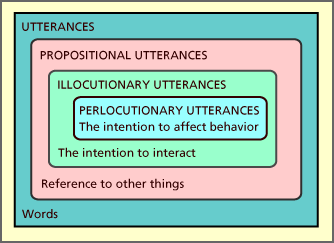Speech Acts:
Alexis Gottlieb
The idea of illocutionary acts were developed in the early 1960's by J. L. Austin in his book, How to do Things With Words. John Searle refined these ideas in his "Speech Acts Theory". Speech Acts go beyond the physical operation of uttering words, and are the functions that utterances perform that can be broken down into two main parts: force and content. The force of a speech act is the pragmatic function while the content of a speech action is the semantic function. There are three types of speech acts: illocutions, perlocutions, and indirect speech acts.
Illocutionary speech acts can be defined as the intended meaning of a sentence. There are five main types of illocutions.
1. Assertives are statements.
2. Directives give orders, and make demands or requests.
3. Commissives make promises, offers, threats, or refusals
4. Expressives show emotions such as giving praise, congratulations, or forgiveness.
5. Declaratives appoint people to positions.
Perlocutionary speech acts are the actual effects of speech acts. Perlocutionary speech acts usually explain ideas, persuade people, enlighten people, or cause some type of realization to the listener in the conversation, whether the speaker intends them or not.
Here is a diagram of how language can be classified, from simple utterances to the perceived intention by the listeners:

http://www.rdillman.com/HFCL/TUTOR/Relation/Relate.Image/speech.act.model.gif
Indirect speech acts are the subliminal messages that a speaker conveys without actually saying the words of their message. An example of an indirect speech act would be the following:
Jamie: Lou, will you get me a coke from the fridge?
Lou: Did you break your legs?
-Lou does not really care to know if Jamie broke his legs. Lou is asking why Jamie cannot get the beer himself.
Links
1. http://plato.stanford.edu/entries/speech-acts/
- This website is a very extensive overall view of speech acts and their purposes.
2. http://www.carla.umn.edu/speechacts/descriptions.html
- This links includes research projects on speech acts, also taking into account cultural specifics.
3. http://www.uqtr.ca/~vandervk/05_Searle_vanderveken.pdf
- This is an attached pdf from a text book specifically focusing on illocutionary speech acts and logic.
4. http://www.jstor.org/stable/414102
- This is a scholarly article on the relationship between speech acts and their hearers.
5. http://www.ling.upenn.edu/~rnoyer/courses/103/Austin.pdf
- This is a pdf link to J.L. Austin's book, How to Do Things With Words.
6. http://www.youtube.com/watch?v=Pl2cZ0Eb1Bk
- This video would serve as a good interactive learning tool.
7. http://acl.ldc.upenn.edu/J/J80/J80-3002.pdf
- This is a good resource to further understand indirect speech acts.
8. http://www.youtube.com/watch?v=1xbYD79_g98
- This is a real life application of indirect speech.
9. http://online.sfsu.edu/kbach/spchacts.html
- This article has lots of good books to examine.
10. http://www.princeton.edu/~achaney/tmve/wiki100k/docs/John_Searle.html
- This is a biography of John Searle.
Comments (0)
You don't have permission to comment on this page.